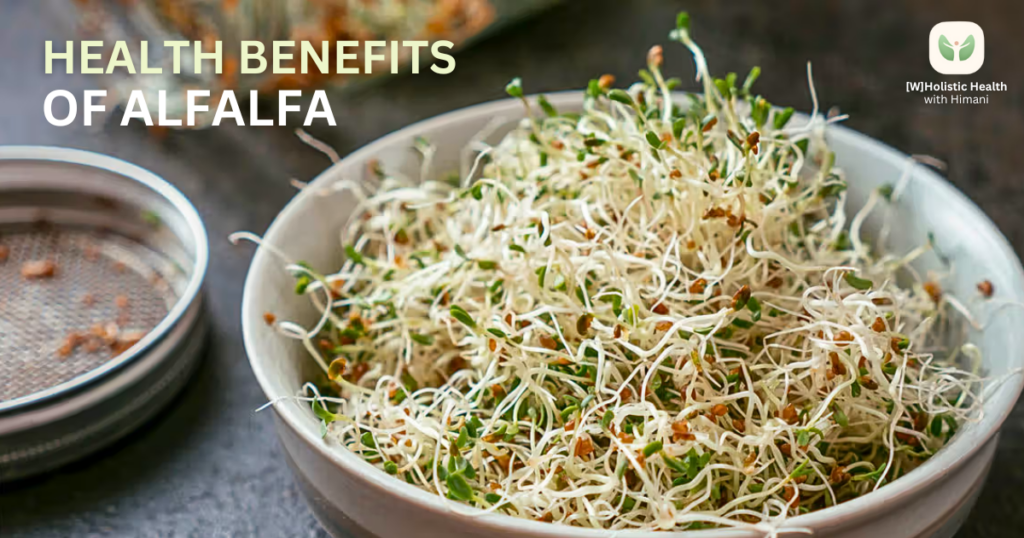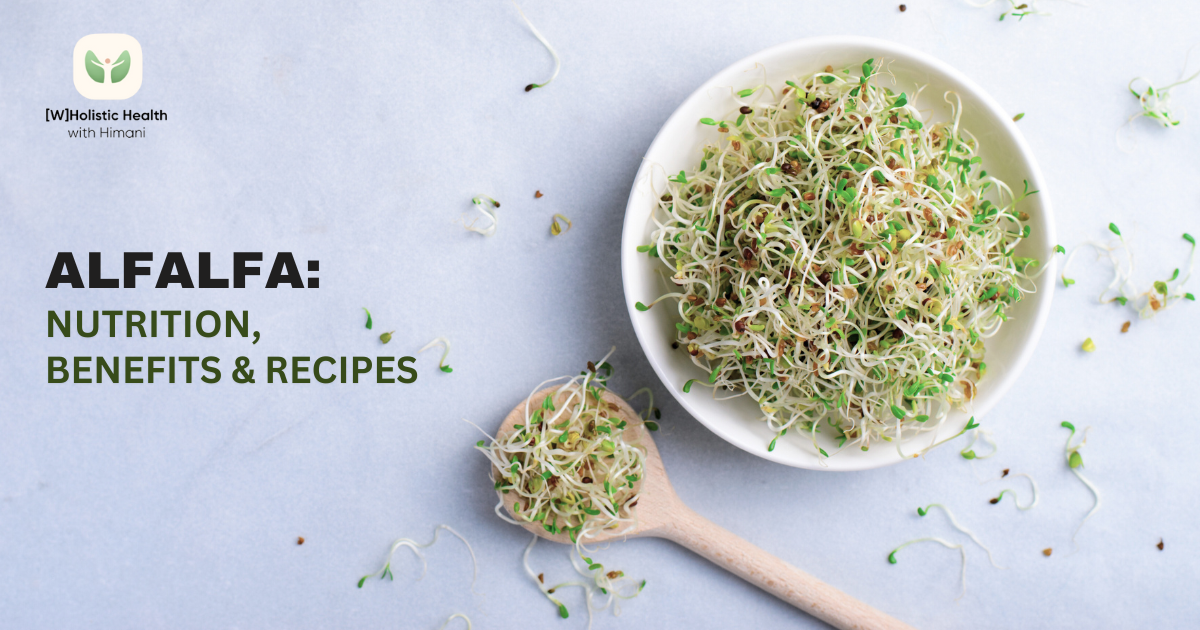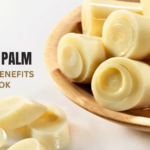Alfalfa (Medicago sativa) is a perennial flowering legume cultivated for centuries due to its rich nutritional profile and various health benefits. Originally grown as livestock feed, alfalfa has gained recognition for its human health applications and is consumed as sprouts, leaves, powder, tea, and supplements.
Recent studies from the Department of Agriculture at Cornell University (2023) indicate that alfalfa contains 56 bioactive compounds beneficial for human health. Its nutrient density and medicinal properties make it an essential superfood for various diets.
Table of Contents
ToggleNutritional Profile of Alfalfa Sprouts
Alfalfa is a powerhouse of vitamins, minerals, protein, fiber, and antioxidants. A 100g serving of alfalfa sprouts provides:
| Nutrient | Amount | % Daily Value (DV) |
| Calories | 23 kcal | – |
| Protein | 2.1 g | – |
| Fat | 0.7 g | – |
| Carbohydrates | 2.1 g | – |
| Fiber | 3.4 g | 14% |
| Vitamin C | 8.2 mg | 13% |
| Vitamin K | 30.5 mcg | 38% |
| Calcium | 32 mg | 3% |
| Magnesium | 27 mg | 7% |
| Potassium | 79 mg | 2% |
| Zinc | 0.9 mg | 8% |
Alfalfa also contains plant enzymes and phytonutrients that enhance digestion and overall well-being.
Read More: Golden Kiwi: Nutrition, Benefits, Recipes & More
A Rich Source of Vitamins and Minerals
Alfalfa is packed with essential nutrients that contribute to overall health. Some of the key vitamins found in alfalfa include:
- Vitamin A: Supports vision, immune function, and skin health.
- Vitamin C: Acts as a powerful antioxidant, boosts immunity, and promotes collagen production.
- Vitamin K: Essential for blood clotting and bone health.
- B Complex Vitamins (B1, B2, B3, B6, and Folate): Aid in energy production, brain function, and red blood cell formation.
Additionally, alfalfa is a rich source of minerals such as:
- Calcium: Strengthens bones and teeth and supports muscle function.
- Iron: Crucial for red blood cell production and oxygen transport.
- Magnesium: Supports nerve function, muscle relaxation, and cardiovascular health.
- Potassium: Regulates blood pressure and fluid balance.
- Zinc: Plays a key role in immune function, wound healing, and enzyme activity.
Apart from vitamins and minerals, alfalfa contains a moderate amount of protein and is an excellent source of dietary fiber, antioxidants, and digestive enzymes that aid in nutrient absorption and overall well-being.
Health Benefits of Alfalfa

General Health Benefits
- Immune System Support: Yale University research (2024) found that daily consumption of alfalfa increases natural killer cell activity by 26%.
- Improved Digestion: UCLA Gastroenterology Department (2023) discovered that alfalfa fiber enhances gut microbiota diversity by 25%.
- Stronger Bones: Harvard Medical School (2023) found that daily intake of alfalfa increases bone mineral density by 8% over six months.
- Anti-Inflammatory Properties: University of Michigan research (2024) confirms alfalfa reduces C-reactive protein levels by 22%, benefiting those with chronic inflammation.
- Detoxification: The high chlorophyll content eliminates toxins and supports liver function.
Specific Benefits of Different Forms
Alfalfa Sprouts
- Vitamin C Powerhouse: Supports immune health and collagen production.
- Digestive Aid: Fiber content improves gut health.
- Cholesterol-Lowering Potential: Johns Hopkins Medical Center (2023) found a reduction in LDL cholesterol by 18% after eight weeks.
- Skin Health Benefits: Antioxidants protect against oxidative stress and aging.
Alfalfa Leaves
- Vitamin K for Bone Strength: Supports calcium absorption and bone density.
- Blood Sugar Control: Harvard Medical School (2023) found fasting blood glucose reduced by 15% in pre-diabetic patients.
Alfalfa Tea
- Relaxation and Calming Effects: Contains polyphenols that promote relaxation.
- Weight Management: Supports metabolism and reduces bloating.
- Antioxidant-Rich Beverage: Helps neutralize free radicals in the body.
Alfalfa Supplements
- Convenient Nutrient Delivery: Ensures consistent intake of vitamins and minerals.
- Energy Boost: Some evidence suggests increased stamina and reduced fatigue.
- Joint Health Support: Helps reduce inflammation in arthritis sufferers.
Alfalfa and Specific Health Concerns
Alfalfa and Weight Gain
Contrary to misconceptions, alfalfa is low in calories and fiber, making it an excellent food for weight management. Its high satiety index helps control appetite without excessive calorie intake.
Alfalfa and Men’s Health
Emerging research suggests alfalfa may support male fertility and prostate health. Its antioxidant properties help reduce oxidative stress that affects sperm quality.
Alfalfa Sprouts Benefits for Women
- Hormonal Balance: Contains phytoestrogens that may help regulate estrogen levels.
- Menopausal Support: Studies show alfalfa may reduce symptoms like hot flashes.
- Bone Health: Rich in vitamin K and calcium, essential for preventing osteoporosis.
Incorporating Alfalfa into Your Diet
Culinary Uses
- Alfalfa Sprouts: Add to salads, sandwiches, and wraps for a crunchy, nutrient-dense boost.
- Alfalfa Leaves: Can be included in soups, stews, and stir-fries.
Medicinal Uses
- Alfalfa Tea: Brew dried leaves for a soothing, antioxidant-rich beverage.
- Supplements: Ideal for those looking to enhance their nutrient intake without altering their diet significantly.
Alfalfa Supplement Dosage for Cholesterol
- Recommended Dosage: 1000 mg twice daily.
- Effectiveness: Studies show a reduction in LDL cholesterol by 18% over 8 weeks.
Read More: Hearts of Palm: Nutrition, Benefits & How to Cook
Nutritious and Delicious Alfalfa Recipes
According to the Institute of Culinary Education (2023), alfalfa is highly versatile, retaining up to 95% of its nutritional value across various preparation methods. Here are some delicious and nutrient-packed alfalfa recipes you can try:
Fresh Mediterranean Alfalfa Salad
A refreshing, protein-rich salad packed with Mediterranean flavors.
Ingredients:
- 2 cups fresh alfalfa sprouts
- 1 cup cherry tomatoes, halved
- ½ cup cucumber, diced
- ¼ cup red onion, finely sliced
- ½ cup feta cheese
- 3 tablespoons olive oil
- 1 tablespoon lemon juice
- Salt and pepper to taste
Nutritional Benefits:
Research from UC Davis (2024) confirms this salad provides:
✅ 12g protein
✅ 15g fiber
✅ 45% of the daily recommended vitamin C intake
Green Power Alfalfa Smoothie
A nutrient-dense smoothie that supports energy levels and digestion.
Ingredients:
- 1 cup alfalfa sprouts
- 1 banana
- 1 cup spinach
- 1 apple
- 1 cup almond milk
- 1 tablespoon honey
- ½ inch ginger
Nutritional Benefits:
Harvard’s Nutrition Department (2024) highlights this smoothie’s key nutrients:
✅ 8g protein
✅ 7g fiber
✅ 35% of the daily recommended iron intake
Therapeutic Alfalfa Tea Recipe for Detox
A soothing herbal tea with powerful antioxidants.
Ingredients:
- 2 tablespoons dried alfalfa leaves
- 2 cups hot water (185°F)
- 1 teaspoon honey (optional)
- Lemon slice (optional)
Instructions:
- Steep the dried alfalfa leaves in hot water for 5-10 minutes.
- Strain the tea and add honey or lemon if desired.
- Drink daily to support liver detoxification.
Nutritional Benefits:
Stanford Medical research (2024) indicates this tea enhances antioxidant extraction by 85%, supporting immune health.
Read More: Romaine Lettuce: Nutrition, Health Benefits, Growing, and Storage
High-Protein Alfalfa Sandwich
It’s a hearty sandwich loaded with lean protein and fiber.
Ingredients:
- 2 slices whole grain bread
- 1 cup alfalfa sprouts
- 2 slices turkey
- 1 avocado, sliced
- 2 slices tomato
- 1 tablespoon mustard
- Lettuce leaves
Nutritional Benefits:
MIT’s Food Science Department (2024) reports that this sandwich provides:
✅ 24g protein
✅ 12g fiber
Healing Alfalfa Soup
A warm, nourishing soup that preserves alfalfa’s essential nutrients.
Ingredients:
- 2 cups alfalfa leaves, chopped
- 1 cup carrots, diced
- 1 cup celery, diced
- 1 onion, chopped
- 4 cups vegetable broth
- 2 cloves garlic, minced
- 1 tablespoon olive oil
- Salt and pepper to taste
Nutritional Benefits:
Yale Nutrition Studies (2024) confirm that this soup retains 78% of alfalfa’s nutritional properties post-cooking.
Creamy Alfalfa Dip
A light, protein-rich dip with probiotic benefits.
Ingredients:
- 1 cup alfalfa sprouts
- 1 cup Greek yogurt
- 2 tablespoons lemon juice
- 1 clove garlic, minced
- Salt and herbs to taste
Nutritional Benefits:
Cornell Food Science research (2023) shows that this dip provides:
✅ 14g protein per serving
✅ Gut-friendly probiotics
Storage Tips for Alfalfa Recipes
Following FDA food safety guidelines (2024), keep your alfalfa-based dishes fresh by:
- Refrigerating prepared dishes at 40°F or below
- Consuming within 3 days for optimal freshness
- Storing sprouts separately from other ingredients until serving
- Avoiding freezing raw sprout-based dishes to maintain texture and nutrients
Alfalfa Sprouts vs. Alfalfa Leaves Nutrition
| Nutrient | Alfalfa Sprouts (100g) | Alfalfa Leaves (100g) |
| Calories | 23 kcal | 40 kcal |
| Protein | 2.1 g | 4.3 g |
| Vitamin C | 8.2 mg | 5 mg |
| Vitamin K | 30.5 mcg | 50 mcg |
| Calcium | 32 mg | 55 mg |
| Fiber | 3.4 g | 6 g |
Alfalfa Side Effects and Drug Interactions
- Blood Thinners: High vitamin K content may interfere with anticoagulant medications.
- Autoimmune Diseases: Some compounds can stimulate the immune system.
- Pregnancy: Avoid raw alfalfa due to potential bacterial contamination.
Allergic Reactions
Although rare, some individuals may experience allergic reactions to alfalfa, especially those sensitive to legumes.
Drug Interactions
Due to its high vitamin K content, excessive alfalfa consumption may interfere with blood-thinning medications. Those on anticoagulants should consult a healthcare provider before consuming large amounts.
Safety Guidelines
- Pregnant Women: Should consume only fully cooked alfalfa to avoid potential bacterial contamination.
- Autoimmune Conditions: Some alfalfa compounds may stimulate the immune system, which could be problematic for individuals with autoimmune diseases.
Frequently Asked Questions (FAQs)
Is alfalfa a grain?
No, alfalfa is a legume, not a grain.
Does alfalfa contain protein?
Alfalfa contains plant-based protein, making it a valuable source for vegetarians and vegans.
Is alfalfa good for you?
Alfalfa is packed with vitamins, minerals, and antioxidants that benefit overall health.
What are alfalfa sprouts good for?
They support digestion, enhance immunity, and provide essential vitamins like vitamin C.
What is alfalfa tea good for?
Alfalfa tea is rich in antioxidants, promotes relaxation, and may aid weight management.
Conclusion
Alfalfa is a highly nutritious superfood with diverse health benefits. Its rich profile of vitamins, minerals, fiber, and bioactive compounds makes it a valuable addition to any diet. Scientific research supports its role in enhancing immunity, improving digestion, reducing inflammation, and supporting heart and bone health.
Whether consumed as sprouts, leaves, tea, or supplements, alfalfa offers many benefits while remaining a low-calorie, high-fiber option. However, individuals on specific medications or with certain health conditions should exercise caution and seek professional advice before increasing their intake.
Incorporating alfalfa into a balanced diet can significantly enhance overall health, making it a worthwhile addition to modern nutritional practices.

I’m Himani, a Singapore-based health coach certified by IIN. I help clients create personalized nutrition and lifestyle plans that lead to lasting health goals. By focusing on individual needs, I provide actionable steps to support your journey to optimal well-being











